Data Mining and Analysis:
Fundamental Concepts and Algorithms
Mohammed J. Zaki
Wagner Meira Jr.
�
CONTENTS
Contents
Preface
1 Data Mining and Analysis
1.1 Data Matrix . . . . . . . . . . . . . . . . . . . . . . . . . . . . . . . .
1.2 Attributes . . . . . . . . . . . . . . . . . . . . . . . . . . . . . . . . .
1.3 Data: Algebraic and Geometric View . . . . . . . . . . . . . . . . . .
1.3.1 Distance and Angle . . . . . . . . . . . . . . . . . . . . . . . .
1.3.2 Mean and Total Variance
. . . . . . . . . . . . . . . . . . . .
1.3.3 Orthogonal Projection . . . . . . . . . . . . . . . . . . . . . .
1.3.4 Linear Independence and Dimensionality . . . . . . . . . . . .
1.4 Data: Probabilistic View . . . . . . . . . . . . . . . . . . . . . . . . .
1.4.1 Bivariate Random Variables . . . . . . . . . . . . . . . . . . .
. . . . . . . . . . . . . . . . .
1.4.2 Multivariate Random Variable
1.4.3 Random Sample and Statistics
. . . . . . . . . . . . . . . . .
1.5 Data Mining . . . . . . . . . . . . . . . . . . . . . . . . . . . . . . . .
1.5.1 Exploratory Data Analysis . . . . . . . . . . . . . . . . . . . .
1.5.2 Frequent Pattern Mining . . . . . . . . . . . . . . . . . . . . .
1.5.3 Clustering . . . . . . . . . . . . . . . . . . . . . . . . . . . . .
1.5.4 Classification . . . . . . . . . . . . . . . . . . . . . . . . . . .
1.6 Further Reading . . . . . . . . . . . . . . . . . . . . . . . . . . . . .
1.7 Exercises . . . . . . . . . . . . . . . . . . . . . . . . . . . . . . . . . .
I Data Analysis Foundations
2 Numeric Attributes
2.1 Univariate Analysis . . . . . . . . . . . . . . . . . . . . . . . . . . . .
2.1.1 Measures of Central Tendency . . . . . . . . . . . . . . . . . .
2.1.2 Measures of Dispersion . . . . . . . . . . . . . . . . . . . . . .
. . . . . . . . . . . . . . . . . . . . . . . . . . . .
2.2.1 Measures of Location and Dispersion . . . . . . . . . . . . . .
2.2.2 Measures of Association . . . . . . . . . . . . . . . . . . . . .
2.2 Bivariate Analysis
i
1
4
4
6
7
9
13
14
15
17
24
28
29
31
31
33
33
34
35
36
37
38
38
39
43
48
49
50
�
CONTENTS
2.3 Multivariate Analysis . . . . . . . . . . . . . . . . . . . . . . . . . . .
2.4 Data Normalization . . . . . . . . . . . . . . . . . . . . . . . . . . . .
2.5 Normal Distribution . . . . . . . . . . . . . . . . . . . . . . . . . . .
2.5.1 Univariate Normal Distribution . . . . . . . . . . . . . . . . .
2.5.2 Multivariate Normal Distribution . . . . . . . . . . . . . . . .
2.6 Further Reading . . . . . . . . . . . . . . . . . . . . . . . . . . . . .
2.7 Exercises . . . . . . . . . . . . . . . . . . . . . . . . . . . . . . . . . .
ii
54
59
61
61
63
68
68
3 Categorical Attributes
3.2 Bivariate Analysis
71
71
3.1 Univariate Analysis . . . . . . . . . . . . . . . . . . . . . . . . . . . .
71
3.1.1 Bernoulli Variable
. . . . . . . . . . . . . . . . . . . . . . . .
74
3.1.2 Multivariate Bernoulli Variable . . . . . . . . . . . . . . . . .
81
. . . . . . . . . . . . . . . . . . . . . . . . . . . .
88
3.2.1 Attribute Dependence: Contingency Analysis . . . . . . . . .
93
3.3 Multivariate Analysis . . . . . . . . . . . . . . . . . . . . . . . . . . .
95
. . . . . . . . . . . . . . . .
98
3.4 Distance and Angle . . . . . . . . . . . . . . . . . . . . . . . . . . . .
3.5 Discretization . . . . . . . . . . . . . . . . . . . . . . . . . . . . . . . 100
3.6 Further Reading . . . . . . . . . . . . . . . . . . . . . . . . . . . . . 102
3.7 Exercises . . . . . . . . . . . . . . . . . . . . . . . . . . . . . . . . . . 103
3.3.1 Multi-way Contingency Analysis
4 Graph Data
105
4.1 Graph Concepts . . . . . . . . . . . . . . . . . . . . . . . . . . . . . . 105
4.2 Topological Attributes . . . . . . . . . . . . . . . . . . . . . . . . . . 110
4.3 Centrality Analysis . . . . . . . . . . . . . . . . . . . . . . . . . . . . 115
4.3.1 Basic Centralities . . . . . . . . . . . . . . . . . . . . . . . . . 115
4.3.2 Web Centralities
. . . . . . . . . . . . . . . . . . . . . . . . . 117
4.4 Graph Models . . . . . . . . . . . . . . . . . . . . . . . . . . . . . . . 126
4.4.1 Erdös-Rényi Random Graph Model . . . . . . . . . . . . . . . 129
4.4.2 Watts-Strogatz Small-world Graph Model
. . . . . . . . . . . 133
. . . . . . . . . . . . . . . . 139
4.4.3 Barabási-Albert Scale-free Model
4.5 Further Reading . . . . . . . . . . . . . . . . . . . . . . . . . . . . . 147
4.6 Exercises . . . . . . . . . . . . . . . . . . . . . . . . . . . . . . . . . . 148
5 Kernel Methods
150
5.1 Kernel Matrix . . . . . . . . . . . . . . . . . . . . . . . . . . . . . . . 155
5.1.1 Reproducing Kernel Map . . . . . . . . . . . . . . . . . . . . 156
5.1.2 Mercer Kernel Map . . . . . . . . . . . . . . . . . . . . . . . . 158
5.2 Vector Kernels
. . . . . . . . . . . . . . . . . . . . . . . . . . . . . . 161
5.3 Basic Kernel Operations in Feature Space . . . . . . . . . . . . . . . 166
. . . . . . . . . . . . . . . . . . . . . . 173
5.4 Kernels for Complex Objects
Spectrum Kernel for Strings . . . . . . . . . . . . . . . . . . . 173
. . . . . . . . . . . . . . . 175
5.4.1
5.4.2 Diffusion Kernels on Graph Nodes
�
CONTENTS
iii
5.5 Further Reading . . . . . . . . . . . . . . . . . . . . . . . . . . . . . 180
5.6 Exercises . . . . . . . . . . . . . . . . . . . . . . . . . . . . . . . . . . 180
6 High-Dimensional Data
182
6.1 High-Dimensional Objects . . . . . . . . . . . . . . . . . . . . . . . . 182
6.2 High-Dimensional Volumes . . . . . . . . . . . . . . . . . . . . . . . . 184
6.3 Hypersphere Inscribed within Hypercube . . . . . . . . . . . . . . . . 187
6.4 Volume of Thin Hypersphere Shell
. . . . . . . . . . . . . . . . . . . 189
6.5 Diagonals in Hyperspace . . . . . . . . . . . . . . . . . . . . . . . . . 190
6.6 Density of the Multivariate Normal . . . . . . . . . . . . . . . . . . . 191
6.7 Appendix: Derivation of Hypersphere Volume . . . . . . . . . . . . . 195
6.8 Further Reading . . . . . . . . . . . . . . . . . . . . . . . . . . . . . 200
6.9 Exercises . . . . . . . . . . . . . . . . . . . . . . . . . . . . . . . . . . 200
7 Dimensionality Reduction
204
7.1 Background . . . . . . . . . . . . . . . . . . . . . . . . . . . . . . . . 204
7.2 Principal Component Analysis . . . . . . . . . . . . . . . . . . . . . . 209
7.2.1 Best Line Approximation . . . . . . . . . . . . . . . . . . . . 209
7.2.2 Best Two-dimensional Approximation . . . . . . . . . . . . . 213
7.2.3 Best r-dimensional Approximation . . . . . . . . . . . . . . . 217
7.2.4 Geometry of PCA . . . . . . . . . . . . . . . . . . . . . . . . 222
7.3 Kernel Principal Component Analysis (Kernel PCA) . . . . . . . . . 225
7.4 Singular Value Decomposition . . . . . . . . . . . . . . . . . . . . . . 233
7.4.1 Geometry of SVD . . . . . . . . . . . . . . . . . . . . . . . . 234
7.4.2 Connection between SVD and PCA . . . . . . . . . . . . . . . 235
7.5 Further Reading . . . . . . . . . . . . . . . . . . . . . . . . . . . . . 237
7.6 Exercises . . . . . . . . . . . . . . . . . . . . . . . . . . . . . . . . . . 238
II Frequent Pattern Mining
240
8 Itemset Mining
241
8.1 Frequent Itemsets and Association Rules . . . . . . . . . . . . . . . . 241
Itemset Mining Algorithms
8.2
. . . . . . . . . . . . . . . . . . . . . . . 245
8.2.1 Level-Wise Approach: Apriori Algorithm . . . . . . . . . . . 247
8.2.2 Tidset Intersection Approach: Eclat Algorithm . . . . . . . . 250
8.2.3 Frequent Pattern Tree Approach: FPGrowth Algorithm . . . 256
8.3 Generating Association Rules . . . . . . . . . . . . . . . . . . . . . . 260
8.4 Further Reading . . . . . . . . . . . . . . . . . . . . . . . . . . . . . 263
8.5 Exercises . . . . . . . . . . . . . . . . . . . . . . . . . . . . . . . . . . 263
�
CONTENTS
iv
9 Summarizing Itemsets
269
9.1 Maximal and Closed Frequent Itemsets . . . . . . . . . . . . . . . . . 269
9.2 Mining Maximal Frequent Itemsets: GenMax Algorithm . . . . . . . 273
9.3 Mining Closed Frequent Itemsets: Charm algorithm . . . . . . . . . 275
9.4 Non-Derivable Itemsets . . . . . . . . . . . . . . . . . . . . . . . . . . 278
9.5 Further Reading . . . . . . . . . . . . . . . . . . . . . . . . . . . . . 284
9.6 Exercises . . . . . . . . . . . . . . . . . . . . . . . . . . . . . . . . . . 285
10 Sequence Mining
289
10.1 Frequent Sequences . . . . . . . . . . . . . . . . . . . . . . . . . . . . 289
. . . . . . . . . . . . . . . . . . . . . . . 290
10.2 Mining Frequent Sequences
10.2.1 Level-Wise Mining: GSP . . . . . . . . . . . . . . . . . . . . . 292
10.2.2 Vertical Sequence Mining: SPADE . . . . . . . . . . . . . . . 293
10.2.3 Projection-Based Sequence Mining: PrefixSpan . . . . . . . . 296
10.3 Substring Mining via Suffix Trees . . . . . . . . . . . . . . . . . . . . 298
10.3.1 Suffix Tree
. . . . . . . . . . . . . . . . . . . . . . . . . . . . 298
10.3.2 Ukkonen’s Linear Time Algorithm . . . . . . . . . . . . . . . 301
10.4 Further Reading . . . . . . . . . . . . . . . . . . . . . . . . . . . . . 309
10.5 Exercises . . . . . . . . . . . . . . . . . . . . . . . . . . . . . . . . . . 309
11 Graph Pattern Mining
314
11.1 Isomorphism and Support . . . . . . . . . . . . . . . . . . . . . . . . 314
11.2 Candidate Generation . . . . . . . . . . . . . . . . . . . . . . . . . . 318
11.2.1 Canonical Code . . . . . . . . . . . . . . . . . . . . . . . . . . 320
11.3 The gSpan Algorithm . . . . . . . . . . . . . . . . . . . . . . . . . . 323
11.3.1 Extension and Support Computation . . . . . . . . . . . . . . 326
11.3.2 Canonicality Checking . . . . . . . . . . . . . . . . . . . . . . 330
11.4 Further Reading . . . . . . . . . . . . . . . . . . . . . . . . . . . . . 331
11.5 Exercises . . . . . . . . . . . . . . . . . . . . . . . . . . . . . . . . . . 333
12 Pattern and Rule Assessment
12.1 Rule and Pattern Assessment Measures
337
. . . . . . . . . . . . . . . . 337
12.1.1 Rule Assessment Measures . . . . . . . . . . . . . . . . . . . . 338
12.1.2 Pattern Assessment Measures . . . . . . . . . . . . . . . . . . 346
12.1.3 Comparing Multiple Rules and Patterns . . . . . . . . . . . . 349
. . . . . . . . . . . . . 354
12.2.1 Fisher Exact Test for Productive Rules . . . . . . . . . . . . . 354
12.2.2 Permutation Test for Significance . . . . . . . . . . . . . . . . 359
12.2.3 Bootstrap Sampling for Confidence Interval
. . . . . . . . . . 364
12.3 Further Reading . . . . . . . . . . . . . . . . . . . . . . . . . . . . . 367
12.4 Exercises . . . . . . . . . . . . . . . . . . . . . . . . . . . . . . . . . . 368
12.2 Significance Testing and Confidence Intervals
�
CONTENTS
III Clustering
v
370
13 Representative-based Clustering
371
13.1 K-means Algorithm . . . . . . . . . . . . . . . . . . . . . . . . . . . . 372
13.2 Kernel K-means . . . . . . . . . . . . . . . . . . . . . . . . . . . . . . 375
13.3 Expectation Maximization (EM) Clustering . . . . . . . . . . . . . . 381
13.3.1 EM in One Dimension . . . . . . . . . . . . . . . . . . . . . . 383
13.3.2 EM in d-Dimensions . . . . . . . . . . . . . . . . . . . . . . . 386
13.3.3 Maximum Likelihood Estimation . . . . . . . . . . . . . . . . 393
13.3.4 Expectation-Maximization Approach . . . . . . . . . . . . . . 397
13.4 Further Reading . . . . . . . . . . . . . . . . . . . . . . . . . . . . . 400
13.5 Exercises . . . . . . . . . . . . . . . . . . . . . . . . . . . . . . . . . . 401
14 Hierarchical Clustering
404
14.1 Preliminaries
. . . . . . . . . . . . . . . . . . . . . . . . . . . . . . . 404
14.2 Agglomerative Hierarchical Clustering . . . . . . . . . . . . . . . . . 407
14.2.1 Distance between Clusters . . . . . . . . . . . . . . . . . . . . 407
14.2.2 Updating Distance Matrix . . . . . . . . . . . . . . . . . . . . 411
14.2.3 Computational Complexity . . . . . . . . . . . . . . . . . . . 413
14.3 Further Reading . . . . . . . . . . . . . . . . . . . . . . . . . . . . . 413
14.4 Exercises and Projects . . . . . . . . . . . . . . . . . . . . . . . . . . 414
15 Density-based Clustering
417
15.1 The DBSCAN Algorithm . . . . . . . . . . . . . . . . . . . . . . . . 418
15.2 Kernel Density Estimation . . . . . . . . . . . . . . . . . . . . . . . . 421
15.2.1 Univariate Density Estimation . . . . . . . . . . . . . . . . . 422
15.2.2 Multivariate Density Estimation . . . . . . . . . . . . . . . . 424
15.2.3 Nearest Neighbor Density Estimation . . . . . . . . . . . . . . 427
15.3 Density-based Clustering: DENCLUE . . . . . . . . . . . . . . . . . 428
15.4 Further Reading . . . . . . . . . . . . . . . . . . . . . . . . . . . . . 434
15.5 Exercises . . . . . . . . . . . . . . . . . . . . . . . . . . . . . . . . . . 434
16 Spectral and Graph Clustering
438
16.1 Graphs and Matrices . . . . . . . . . . . . . . . . . . . . . . . . . . . 438
. . . . . . . . . . . . . . . . . . . . . . . . 446
16.2 Clustering as Graph Cuts
. 448
16.2.1 Clustering Objective Functions: Ratio and Normalized Cut
16.2.2 Spectral Clustering Algorithm . . . . . . . . . . . . . . . . . . 451
16.2.3 Maximization Objectives: Average Cut and Modularity . . . . 455
16.3 Markov Clustering . . . . . . . . . . . . . . . . . . . . . . . . . . . . 463
16.4 Further Reading . . . . . . . . . . . . . . . . . . . . . . . . . . . . . 470
16.5 Exercises . . . . . . . . . . . . . . . . . . . . . . . . . . . . . . . . . . 471
�
CONTENTS
vi
17 Clustering Validation
17.1 External Measures
473
. . . . . . . . . . . . . . . . . . . . . . . . . . . . 474
17.1.1 Matching Based Measures . . . . . . . . . . . . . . . . . . . . 474
17.1.2 Entropy Based Measures . . . . . . . . . . . . . . . . . . . . . 479
17.1.3 Pair-wise Measures . . . . . . . . . . . . . . . . . . . . . . . . 482
17.1.4 Correlation Measures . . . . . . . . . . . . . . . . . . . . . . . 486
17.2 Internal Measures . . . . . . . . . . . . . . . . . . . . . . . . . . . . . 489
17.3 Relative Measures
. . . . . . . . . . . . . . . . . . . . . . . . . . . . 498
17.3.1 Cluster Stability . . . . . . . . . . . . . . . . . . . . . . . . . 505
17.3.2 Clustering Tendency . . . . . . . . . . . . . . . . . . . . . . . 508
17.4 Further Reading . . . . . . . . . . . . . . . . . . . . . . . . . . . . . 513
17.5 Exercises . . . . . . . . . . . . . . . . . . . . . . . . . . . . . . . . . . 514
IV Classification
516
18 Probabilistic Classification
517
18.1 Bayes Classifier . . . . . . . . . . . . . . . . . . . . . . . . . . . . . . 517
18.1.1 Estimating the Prior Probability . . . . . . . . . . . . . . . . 518
18.1.2 Estimating the Likelihood . . . . . . . . . . . . . . . . . . . . 518
18.2 Naive Bayes Classifier
. . . . . . . . . . . . . . . . . . . . . . . . . . 524
18.3 Further Reading . . . . . . . . . . . . . . . . . . . . . . . . . . . . . 528
18.4 Exercises . . . . . . . . . . . . . . . . . . . . . . . . . . . . . . . . . . 528
19 Decision Tree Classifier
530
19.1 Decision Trees . . . . . . . . . . . . . . . . . . . . . . . . . . . . . . . 532
19.2 Decision Tree Algorithm . . . . . . . . . . . . . . . . . . . . . . . . . 535
. . . . . . . . . . . . . . . . 536
19.2.1 Split-point Evaluation Measures
19.2.2 Evaluating Split-points . . . . . . . . . . . . . . . . . . . . . . 537
19.2.3 Computational Complexity . . . . . . . . . . . . . . . . . . . 545
19.3 Further Reading . . . . . . . . . . . . . . . . . . . . . . . . . . . . . 546
19.4 Exercises . . . . . . . . . . . . . . . . . . . . . . . . . . . . . . . . . . 547
549
20 Linear Discriminant Analysis
20.1 Optimal Linear Discriminant
. . . . . . . . . . . . . . . . . . . . . . 549
20.2 Kernel Discriminant Analysis . . . . . . . . . . . . . . . . . . . . . . 556
20.3 Further Reading . . . . . . . . . . . . . . . . . . . . . . . . . . . . . 564
20.4 Exercises . . . . . . . . . . . . . . . . . . . . . . . . . . . . . . . . . . 564
21 Support Vector Machines
566
21.1 Linear Discriminants and Margins
. . . . . . . . . . . . . . . . . . . 566
21.2 SVM: Linear and Separable Case . . . . . . . . . . . . . . . . . . . . 572
21.3 Soft Margin SVM: Linear and Non-Separable Case . . . . . . . . . . 577
�
CONTENTS
vii
21.3.1 Hinge Loss
. . . . . . . . . . . . . . . . . . . . . . . . . . . . 578
21.3.2 Quadratic Loss . . . . . . . . . . . . . . . . . . . . . . . . . . 582
21.4 Kernel SVM: Nonlinear Case
. . . . . . . . . . . . . . . . . . . . . . 583
21.5 SVM Training Algorithms . . . . . . . . . . . . . . . . . . . . . . . . 588
21.5.1 Dual Solution: Stochastic Gradient Ascent . . . . . . . . . . . 588
21.5.2 Primal Solution: Newton Optimization . . . . . . . . . . . . . 593
22 Classification Assessment
22.1 Classification Performance Measures
602
. . . . . . . . . . . . . . . . . . 602
22.1.1 Contingency Table Based Measures . . . . . . . . . . . . . . . 604
22.1.2 Binary Classification: Positive and Negative Class
. . . . . . 607
22.1.3 ROC Analysis . . . . . . . . . . . . . . . . . . . . . . . . . . . 611
22.2 Classifier Evaluation . . . . . . . . . . . . . . . . . . . . . . . . . . . 616
22.2.1 K-fold Cross-Validation . . . . . . . . . . . . . . . . . . . . . 617
22.2.2 Bootstrap Resampling . . . . . . . . . . . . . . . . . . . . . . 618
22.2.3 Confidence Intervals
. . . . . . . . . . . . . . . . . . . . . . . 620
22.2.4 Comparing Classifiers: Paired t-Test . . . . . . . . . . . . . . 625
22.3 Bias-Variance Decomposition . . . . . . . . . . . . . . . . . . . . . . 627
. . . . . . . . . . . . . . . . . . . . . . . 632
22.4 Further Reading . . . . . . . . . . . . . . . . . . . . . . . . . . . . . 638
22.5 Exercises . . . . . . . . . . . . . . . . . . . . . . . . . . . . . . . . . . 639
22.3.1 Ensemble Classifiers
Index
641
�
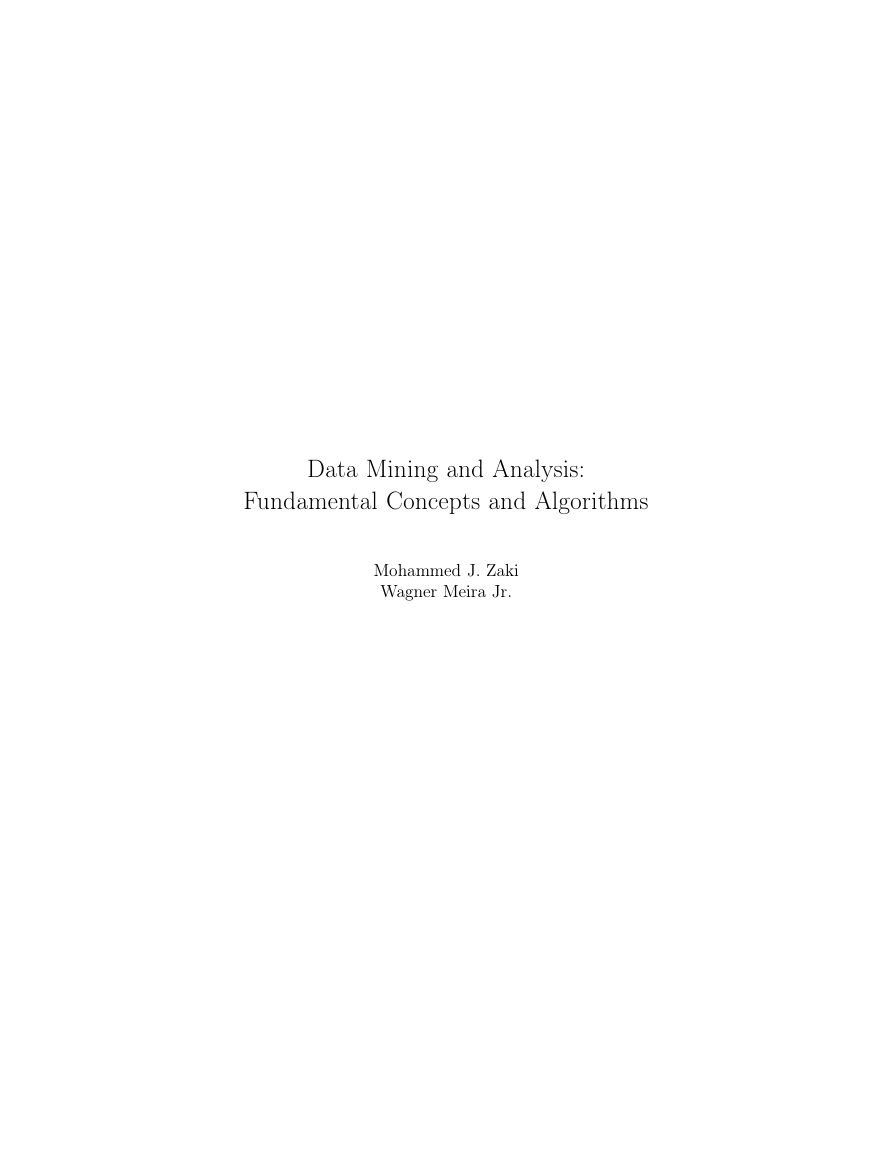
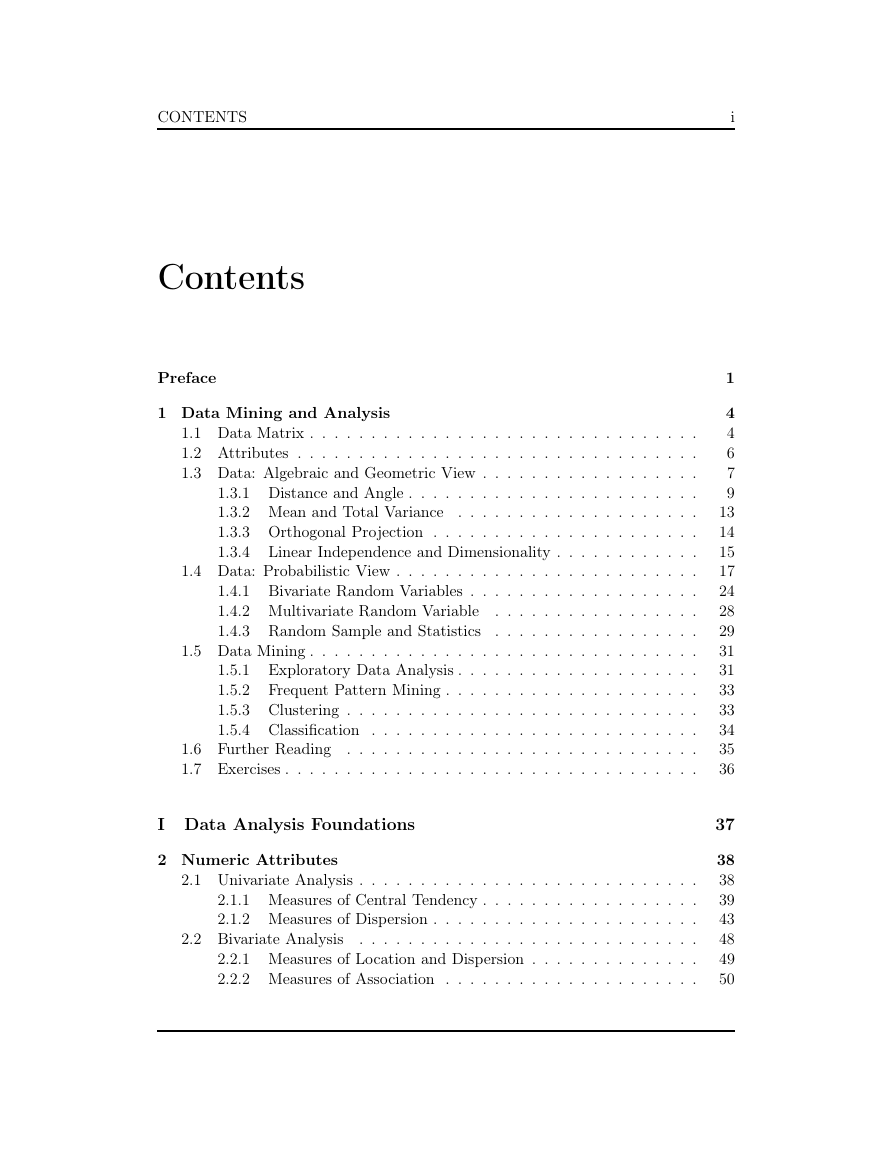
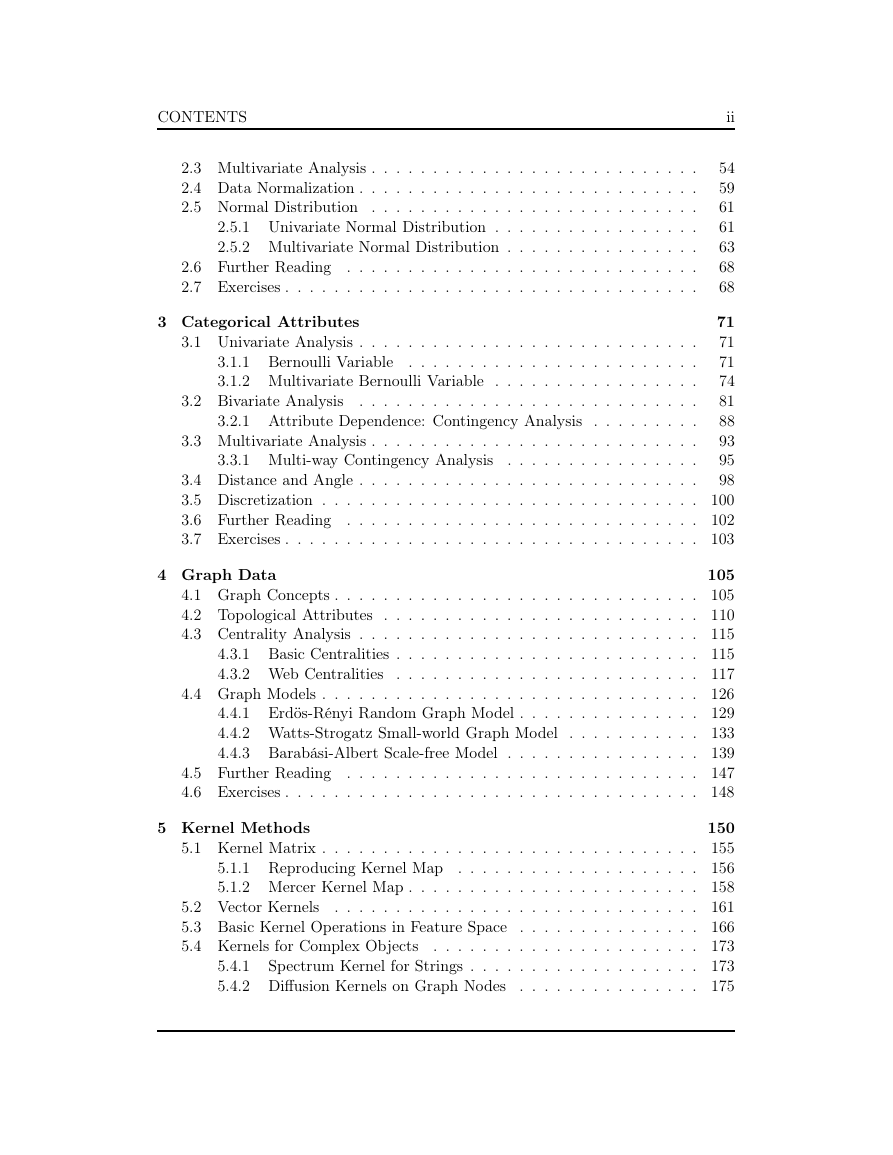
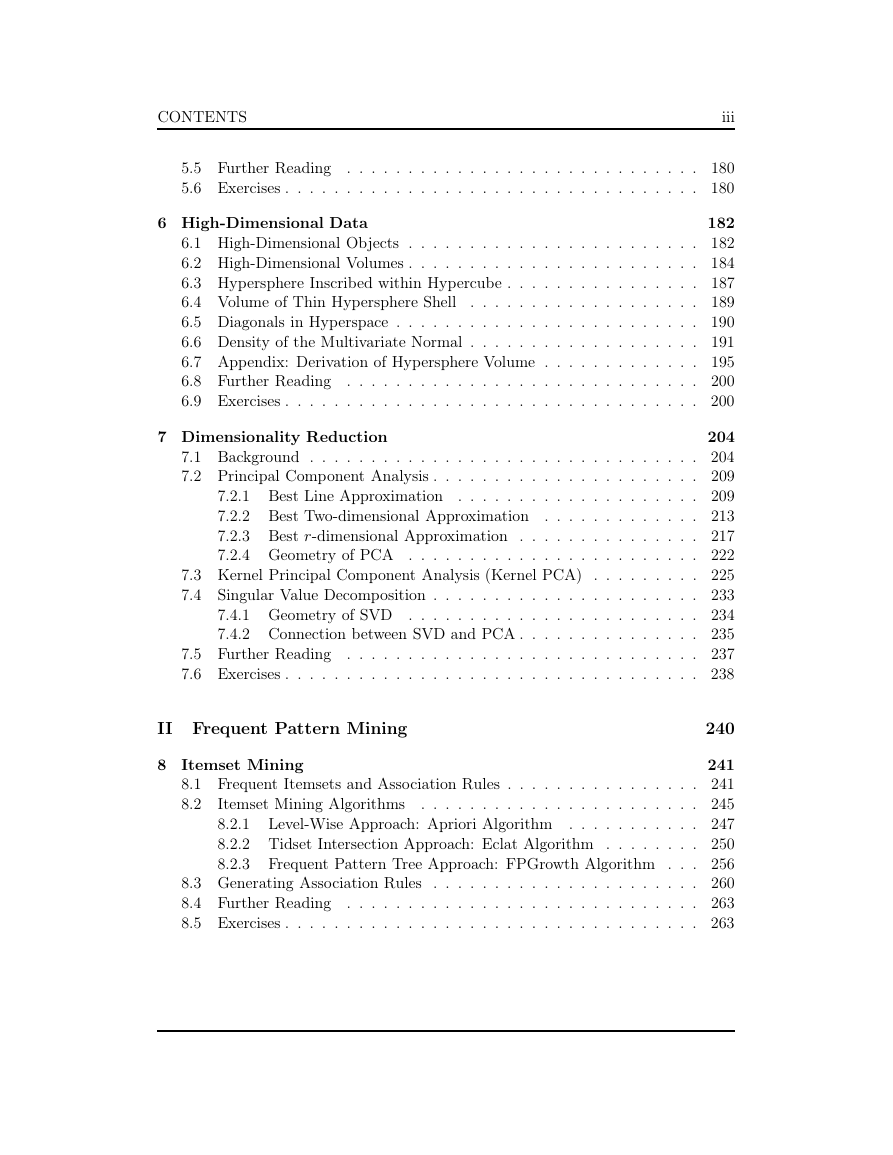
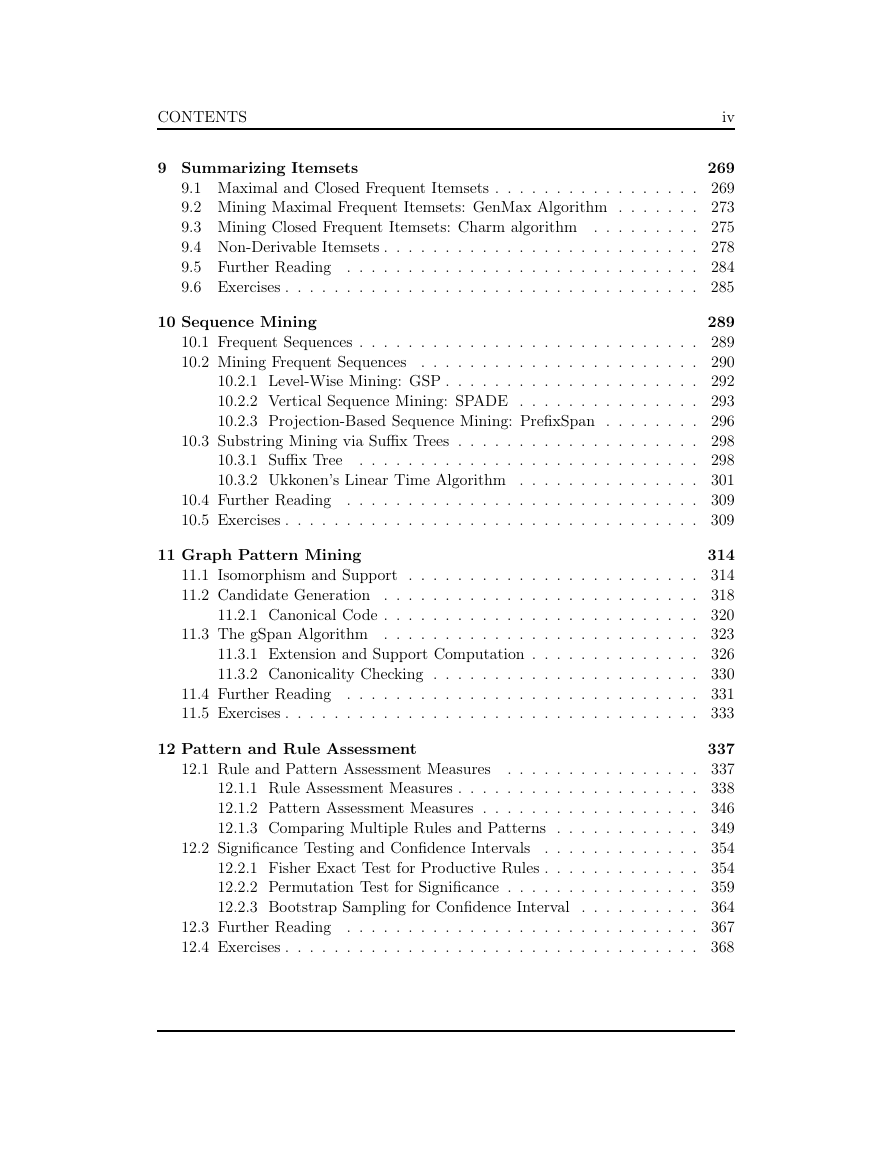
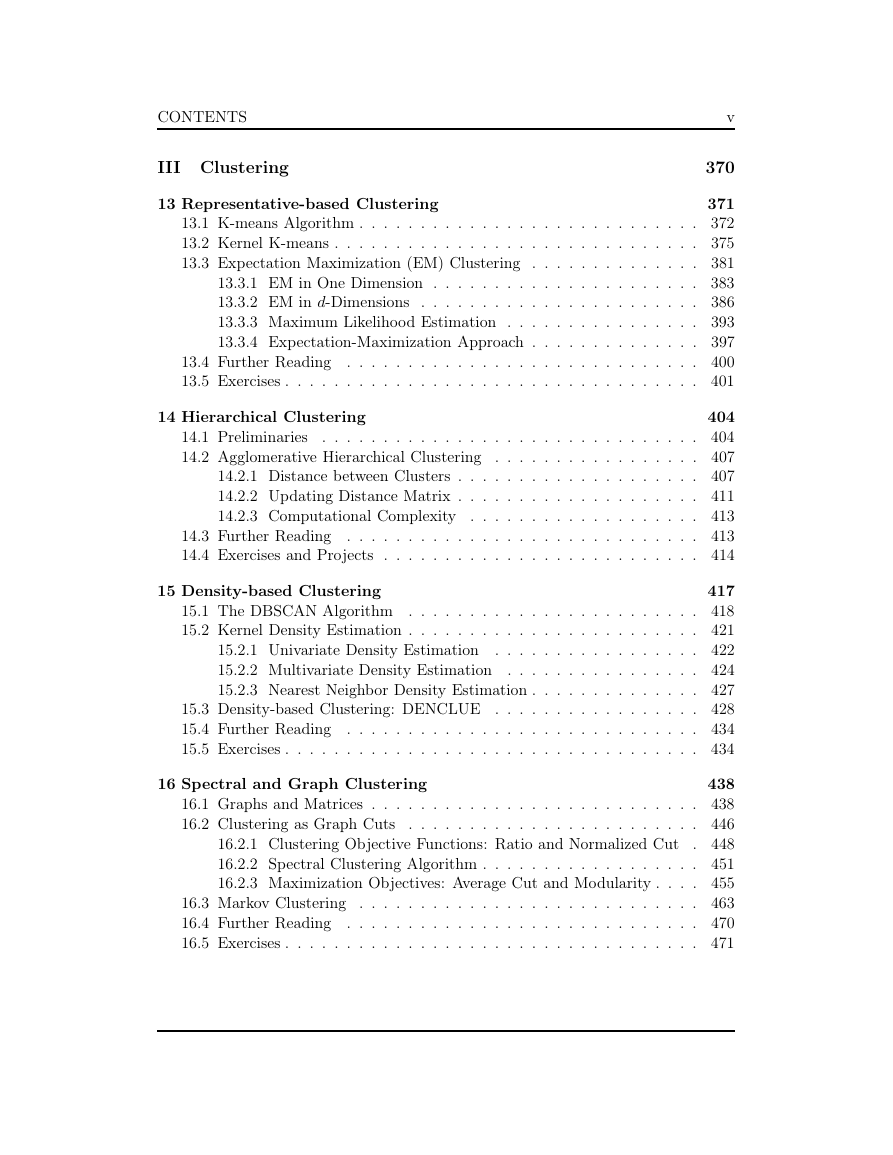
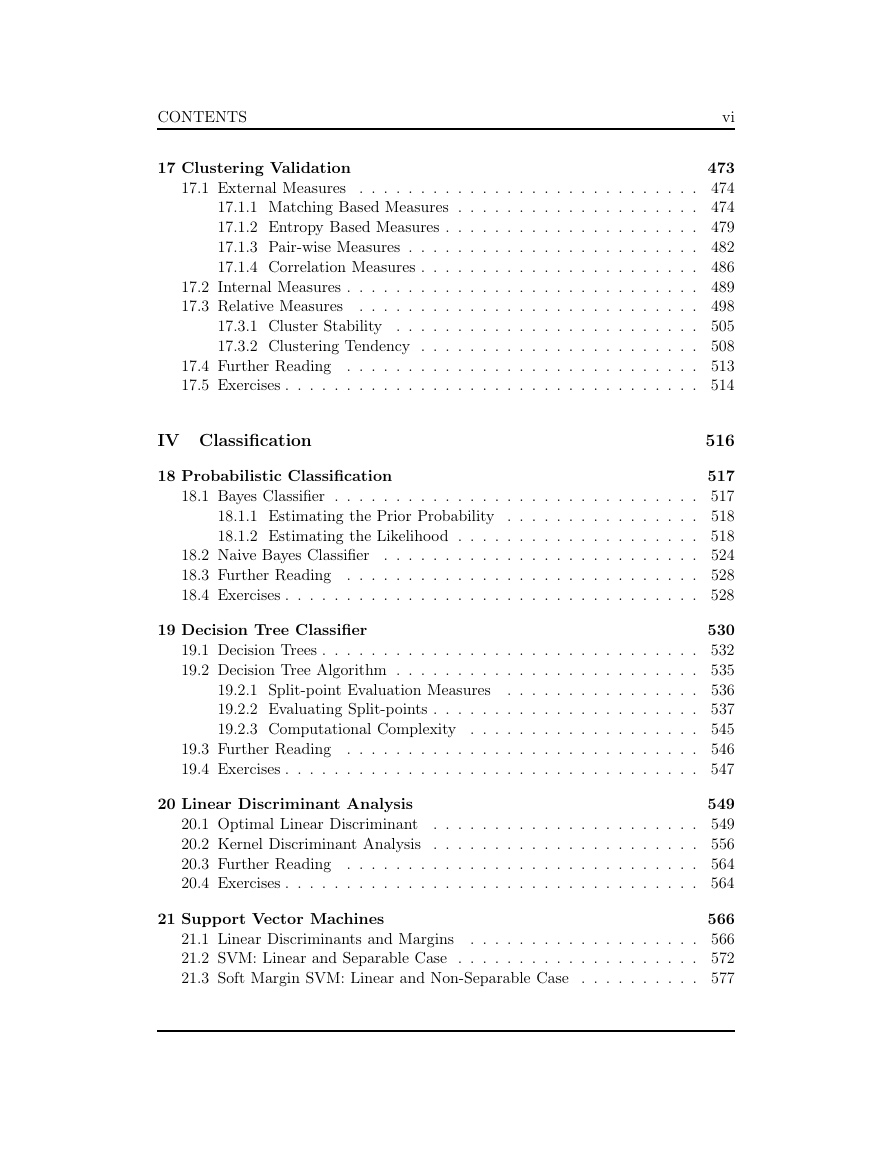









 2023年江西萍乡中考道德与法治真题及答案.doc
2023年江西萍乡中考道德与法治真题及答案.doc 2012年重庆南川中考生物真题及答案.doc
2012年重庆南川中考生物真题及答案.doc 2013年江西师范大学地理学综合及文艺理论基础考研真题.doc
2013年江西师范大学地理学综合及文艺理论基础考研真题.doc 2020年四川甘孜小升初语文真题及答案I卷.doc
2020年四川甘孜小升初语文真题及答案I卷.doc 2020年注册岩土工程师专业基础考试真题及答案.doc
2020年注册岩土工程师专业基础考试真题及答案.doc 2023-2024学年福建省厦门市九年级上学期数学月考试题及答案.doc
2023-2024学年福建省厦门市九年级上学期数学月考试题及答案.doc 2021-2022学年辽宁省沈阳市大东区九年级上学期语文期末试题及答案.doc
2021-2022学年辽宁省沈阳市大东区九年级上学期语文期末试题及答案.doc 2022-2023学年北京东城区初三第一学期物理期末试卷及答案.doc
2022-2023学年北京东城区初三第一学期物理期末试卷及答案.doc 2018上半年江西教师资格初中地理学科知识与教学能力真题及答案.doc
2018上半年江西教师资格初中地理学科知识与教学能力真题及答案.doc 2012年河北国家公务员申论考试真题及答案-省级.doc
2012年河北国家公务员申论考试真题及答案-省级.doc 2020-2021学年江苏省扬州市江都区邵樊片九年级上学期数学第一次质量检测试题及答案.doc
2020-2021学年江苏省扬州市江都区邵樊片九年级上学期数学第一次质量检测试题及答案.doc 2022下半年黑龙江教师资格证中学综合素质真题及答案.doc
2022下半年黑龙江教师资格证中学综合素质真题及答案.doc